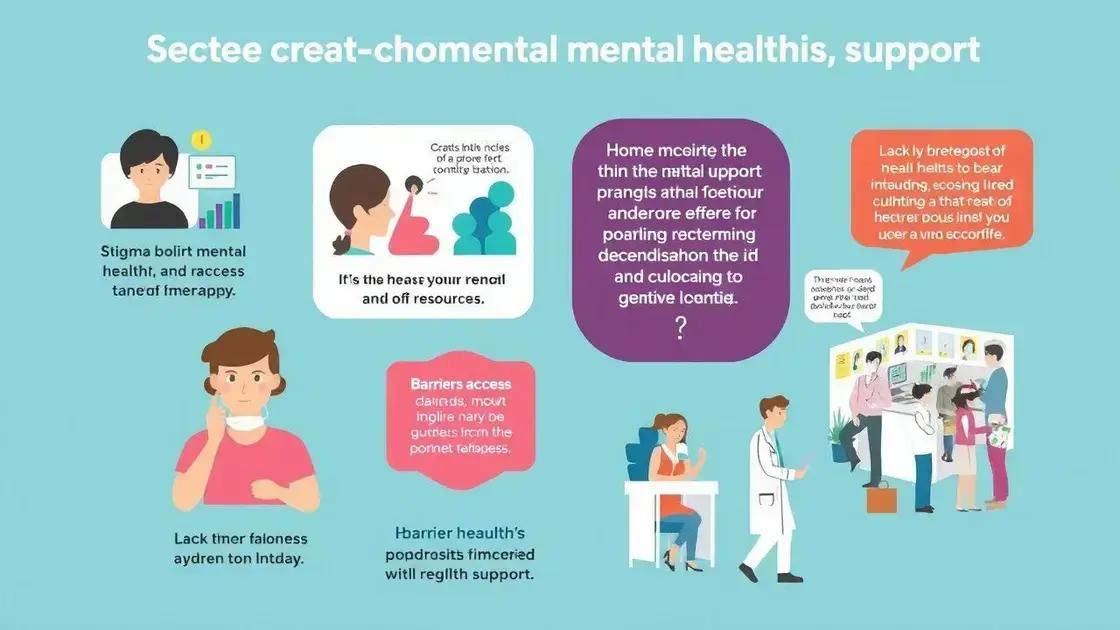Mental health support in benefits: enhancing well-being

Anúncios
Mental health support encompasses various resources and systems designed to help individuals manage mental health challenges, addressing stigma, increasing access, and integrating services into general healthcare is crucial for effective support.
Mental health support in benefits plays a crucial role in helping individuals cope with life’s challenges. Have you ever wondered how accessible support can truly transform lives? Let’s dive into this topic that affects so many.
Anúncios
Understanding mental health support
Understanding mental health support is crucial for fostering a healthier environment in our communities. By recognizing how mental health impacts our daily lives, we can begin to address these important issues effectively.
Many people struggle with mental health challenges, yet support is often overlooked. This understanding helps us appreciate the significance of accessible resources and empathetic care.
Anúncios
What is Mental Health Support?
Mental health support includes various resources and services designed to help individuals manage their mental well-being. This can range from counseling services to support groups, tailored to meet diverse needs.
Types of Support Available
- Therapy and counseling sessions
- Support groups for shared experiences
- Online resources and hotlines
- Workplace mental health programs
Each type of support plays a valuable role in providing help. For instance, therapy offers individualized strategies to cope, while support groups create a sense of community. This combination of options allows people to find what works best for them.
It’s also essential to understand the significance of early intervention. Recognizing signs of mental distress early can lead to better outcomes. As a result, communities should foster environments where discussing mental health is normalized.
Why Mental Health Support Matters
Mental health support not only benefits individuals but also enhances overall community well-being. When people feel supported, they are more likely to thrive. This can reduce risks like isolation and contribute to stronger societal ties.
Building awareness around mental health can motivate individuals to seek help and support others. It is a collective responsibility that strengthens our communities. Understanding and providing mental health support creates a cycle of positive influence.
Benefits of mental health support systems

Benefits of mental health support systems are vital for individuals and communities alike. By providing assistance to those struggling, these systems create healthier environments where everyone can thrive.
One major benefit is the improvement in overall well-being. When individuals have access to support, they are more likely to manage stress and develop coping strategies effectively. This leads to enhanced emotional resilience.
Increased Access to Resources
Support systems can connect individuals to valuable resources. These may include therapy options, educational materials, and community programs designed to promote mental health awareness.
Stronger Community Connections
- Fostering understanding and empathy
- Encouraging open discussions about mental health
- Building networks of support
- Creating safe spaces for sharing experiences
As people engage with mental health support systems, they build trust within their communities. This connection encourages open dialogue, making it easier for others to seek help when needed. Such interactions can greatly reduce the stigma surrounding mental health issues.
Additionally, mental health support systems promote early intervention. When individuals receive help sooner, the chances of managing or overcoming challenges increase. This proactive approach not only benefits the person in need but also reduces strain on healthcare services.
Enhanced Productivity
By participating in mental health support programs, individuals often find improved focus and productivity. A positive mental state contributes to better performance at work and in daily activities. This ripple effect encourages a healthier overall lifestyle.
Organizations can also benefit from prioritizing mental health support. When employees feel supported, they are likely to exhibit higher engagement levels and job satisfaction. This benefits not only the individual but contributes to the workplace culture as a whole.
How to access mental health resources
Accessing mental health resources can significantly improve one’s quality of life. It is essential to know where to look and how to utilize available tools and services.
Many people are not sure where to begin when seeking help. However, there are numerous resources at your disposal, and understanding these can provide a path to better mental health.
Finding Local Resources
One of the first steps is to search for local mental health services. Community centers often offer free or low-cost support. Checking online directories can also reveal nearby therapists and clinics.
Utilizing Telehealth Services
- Online therapy platforms
- Text or chat therapy options
- Virtual support groups
- Hotlines for immediate assistance
Telehealth services have become increasingly popular. They provide flexible options that can fit into busy schedules. These services often include online therapy, which allows for more accessibility, especially in remote areas.
Additionally, many organizations are working to raise awareness about mental health. Schools and workplaces may have programs that connect individuals with resources. Utilizing these programs can provide a supportive network to rely on.
Exploring Nonprofit Organizations
Many nonprofits focus on mental health support. These organizations can offer guidance, provide resources, and connect you with professionals. Examples include local mental health associations or national organizations like the National Alliance on Mental Illness (NAMI).
It is essential to take that first step and reach out. Even if it feels challenging, remembering that help is available can be encouraging. Once you know where to access resources, you can feel more empowered to seek the help you need.
The role of community in mental health support

The role of community in mental health support is essential for fostering a caring environment. Communities can offer various resources, encouragement, and connection, which are vital for those seeking help.
A strong community provides a sense of belonging, which can significantly influence mental well-being. When individuals feel connected to others, they are more likely to reach out for support and engage in healthy activities.
Building Trust and Relationships
Establishing trust within a community is crucial. Open communication allows residents to share their experiences and seek help without fear of judgment. This creates a foundation where individuals feel safe to express their needs.
Community Resources for Mental Health
- Local support groups
- Workshops and educational events
- Access to mental health professionals
- Community centers providing outreach programs
Many communities have resources dedicated to mental health awareness. Regular workshops and events can help educate members about the importance of mental health and the resources available.
Support groups offer invaluable experiences where individuals can share their journeys. These gatherings promote understanding and foster relationships among members, creating a support network.
Encouraging Open Discussions
Communities that prioritize open discussions about mental health can break down stigma. When conversations about mental health are normalized, more people feel comfortable seeking help.
This can include organizing community campaigns, bringing local leaders into the discussion, and using social media to spread awareness. By encouraging dialogue, communities help dismantle barriers that prevent individuals from getting the support they need.
Developing effective mental health support programs
Developing effective mental health support programs is essential for promoting well-being in various settings. These programs can address the diverse needs of individuals and communities.
To create a successful program, it’s crucial to first assess the specific needs of the community. This involves understanding the common mental health challenges faced by residents. Gathering data through surveys and community feedback can provide valuable insights.
Elements of Successful Programs
An effective program often includes several key components. These can ensure that the initiative is comprehensive and relevant:
- Trained mental health professionals
- Accessible resources and materials
- Community-based support groups
- Regular outreach and education initiatives
Having trained professionals involved in the program is vital. They can provide guidance, conduct workshops, and ensure that support is available when needed. Additionally, offering resources helps individuals find the help they require.
Engagement and Outreach
Engaging the community is another important aspect. Programs should actively reach out to members through local events and social media. This will increase awareness and encourage participation.
Facilitating workshops and informational sessions on mental health topics can provide education and reduce stigma. When individuals understand the importance of mental health, they are more likely to engage in supportive activities.
Another effective strategy is to create peer support groups. These groups allow individuals to share experiences and provide mutual support. Participants often find comfort in knowing they are not alone in their struggles.
Ongoing Evaluation and Adaptation
Lastly, it is crucial to continuously evaluate the program’s effectiveness. Gathering feedback and measuring outcomes can help identify areas for improvement. By adapting the program based on community needs, it can remain relevant and impactful.
Programs that prioritize flexibility and responsiveness tend to be the most successful. They can effectively address the changing dynamics of mental health needs within the community, ensuring ongoing support for all.
Challenges in providing mental health support

Challenges in providing mental health support can hinder the effectiveness of programs and services aimed at helping individuals. Many barriers can prevent people from accessing the care they need.
One major challenge is the stigma surrounding mental health issues. In many communities, discussing mental health can still be seen as taboo. This stigma can discourage individuals from seeking help, leading to feelings of isolation.
Lack of Awareness and Education
Another significant barrier is the lack of awareness about available resources. Many people do not know where to find help or what services are available to them. This gap in knowledge can prevent them from taking the necessary steps toward improvement.
Funding and Resource Allocation
- Insufficient funding for mental health programs
- Limited accessibility in rural areas
- Shortage of trained mental health professionals
- Overwhelmed healthcare systems
Funding is crucial in developing and maintaining mental health support services. Many programs struggle to secure necessary financial resources, which limits their reach and effectiveness. Additionally, communities in rural areas often face transportation and accessibility issues, making it harder to access support.
The shortage of trained professionals is another critical issue. With a limited number of qualified mental health experts, waiting times for appointments can be long. This lack of immediate access may deter individuals from seeking care altogether.
Integration with General Healthcare
Integrating mental health into general healthcare services presents another challenge. Often, mental health is viewed separately from physical health, leading to a lack of comprehensive care. Patients may not receive holistic treatment if their mental health needs are overlooked by general practitioners.
Efforts are being made to bridge this gap and encourage collaboration between mental health providers and general healthcare professionals. By working together, these fields can create a more effective and supportive system for individuals seeking help.
FAQ – Frequently Asked Questions about Mental Health Support
What are the main challenges in providing mental health support?
The main challenges include stigma, lack of resources, and limited awareness about available services.
How can communities help reduce stigma around mental health?
Communities can help reduce stigma by encouraging open conversations and providing education on mental health topics.
What can be done to improve access to mental health resources?
Improving access can involve securing funding for programs, offering telehealth options, and increasing awareness of available services.
Why is integration of mental health support into general healthcare important?
Integration is important because it ensures a holistic approach to health, addressing both physical and mental health needs seamlessly.






